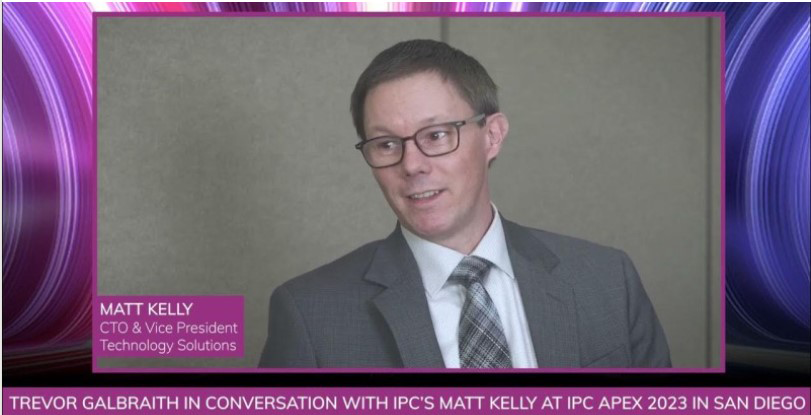| This weekly newsletter provides a snapshot of the top government policy issues we are working on for you all over the world – in a five-minute scan.
Please let us know if you have any questions or suggestions.
All the best,
Chris Mitchell
Vice President, Global Government Relations
The Headlines at a Glance:
TOP NEWS OF THE WEEK
- United States to Create Multiple Advanced Packaging Facilities by 2030
- My Top Ten Takeaways from IPC APEX EXPO
QUOTE OF THE WEEK
- IPC President and CEO John W. Mitchell on How Industry Can Combat Workforce Challenges
IPC ADVOCACY AND YOU
- How Can Government Help or Hurt You in 2023?
ENVIRONMENT AND HEALTH
- Understanding PFAS – A Key Issue for Environmental Protection
- EPA Proposes to Block Over 300 PFAS on TSCA Inventory
EUROPEAN UNION
- EU Commission Seeks Input on Environmental Initiative to Reduce Product Impact
- EU Parliament Addresses Entire Electronics Ecosystem in EU Chips Act
TRAIN AND SUPPLY CHAIN
- Reps. Eshoo and Moore Urge DoD to Bolster PCB and IC Substrate Manufacturing
HELP US SPREAD THE WORD ON SOCIAL MEDIA
KEEP IN TOUCH WITH US
TOP NEWS OF THE WEEK
United States to Create Multiple Advanced Packaging Facilities by 2030: The United States is set to establish multiple high-volume advanced packaging facilities by 2030 and at least two large-scale semiconductor manufacturing clusters, according to an announcement made by U.S. Commerce Secretary Gina Raimondo. The plans will be financed by the $52 billion CHIPS and Science Act and will form part of a broader effort to bolster America's supply chains and packaging technologies. The clusters will feature research and development (R&D) facilities, specialized infrastructure, and a robust supplier ecosystem. This is the second time in two weeks that Raimondo has acknowledged the need to support the entire electronics ecosystem. IPC has been a steadfast advocate for advanced packaging — the need for which IPC laid out in its November 2021 report. IPC Contact: Chris Mitchell.
My Top Ten Takeaways from IPC APEX EXPO: Get a firsthand look at the top trends and insights from IPC APEX EXPO 2023 with my annual "Top Ten Takeaways" list. This year's conference showcased a renewed focus on sustainability and advanced packaging and featured an EMS leadership summit that brought together top industry leaders. We also welcomed a new wave of young attendees who added fresh perspectives and energy to the event. Check out the full article in I-Connect007's Show and Tell issue, and let us know if you have any takeaways yourself. We look forward to seeing you in Anaheim, CA in 2024! IPC Contact: Chris Mitchell.
QUOTE OF THE WEEK
 |
“You need to find unique and different ways to find people and then have your organization be one that is attractive to them.”
– IPC President and CEO John W. Mitchell addressed workforce challenges, talent shortages, and how to get young people interested in electronics manufacturing in a recent interview with EMSNOW. |
IPC ADVOCACY AND YOU
How Can Government Help or Hurt You in 2023? IPC is conducting a survey to gather information on the top concerns of electronics manufacturing professionals like you and how government policies can either help or hurt you in the next few years. The survey, which will help shape IPC's advocacy efforts in 2023, takes only a few minutes to complete and is a great opportunity to voice your concerns and shape future policies. Read a recent IPC blog about how you can be involved in IPC advocacy in 2023. IPC Contact: Jeff Goldberg.
ENVIRONMENT & HEALTH
Understanding PFAS – A Key Issue for Environmental Protection: Per- and polyfluoroalkyl substances (PFAS) are gaining increasing attention on a state, federal, and global level as more and more policy makers take steps to regulate them due to their long-term persistence in the environment and potential impact on human health. Electronics manufacturing has a particular reliance on PFAS for various applications, including semiconductors, wire and cable insulation, printed circuit boards (PCBs), and more. IPC encourages the electronics industry to examine their supply chain to better understand where PFAS exists, how it is used, what properties they are used for, and whether alternatives exist. Read more in a new IPC blog and let us know if you have any questions. IPC Contact: Suhani Chitalia.
EPA Proposes to Block Over 300 PFAS on TSCA Inventory: The U.S. Environmental Protection Agency (EPA) recently proposed a new rule that would block the manufacturing or processing of approximately 330 per- and poly-fluoroalkyl substances (PFAS) listed as “inactive” under the Toxic Substances Control Act (TSCA). The rule, the latest of several measures the EPA is taking to regulate PFAS chemicals, will require companies to file an application before any additional manufacture, import, or processing of listed chemical substances. Please let us know if you have any questions before comments close on March 27. IPC Contact: Suhani Chitalia.
EUROPEAN UNION
EU Commission Seeks Input on Environmental Initiative to Reduce Product Impact: The European Commission has launched a call for evidence to determine the first priority products for the Environmental Sustainability Performance Requirements (ESPR) under the EU’s Circular Economy Action Plan. The ESPR aims to improve the sustainability of products throughout their life cycle, while also supporting the EU’s internal market. The EU Commission has proposed a number of end-use and intermediary products, as well as horizontal measures based on an initial impact assessment. A questionnaire on the proposed product priorities is now open, while feedback and comments are due by May 12. Let us know if you have any questions. IPC Contact: Kelly Scanlon.
EU Parliament Addresses Entire Electronics Ecosystem in EU Chips Act: The European Parliament last week took important steps toward supporting the entire electronics manufacturing ecosystem, including chips packaging, printed circuit boards (PCBs), and IC substrates. The legislation, called the European Chips Act, aims to build Europe’s supply chain resiliency and security, but a “silicon-to-systems” approach is needed to further strengthen the bloc’s autonomy. IPC urges the adoption of a final package that includes policy support and funding for related parts of the industrial base and remains committed to working with European institutions and other stakeholders to advance a strong and resilient electronics industry in Europe. Read more in an IPC blog. IPC Contact: Chris Mitchell.
TRADE AND SUPPLY CHAIN
Reps. Eshoo and Moore Urge DoD to Bolster PCB and IC Substrate Manufacturing: U.S. Reps. Anna Eshoo (D-CA) and Blake Moore (R-UT) recently called on the U.S. Department of Defense (DoD) to use the Defense Production Act (DPA) to increase domestic production of printed circuit boards (PCBs) and integrated circuit (IC) substrates. With over 50% of PCBs being imported from China, they said it is critical that the DoD increase domestic production and ensure the use of electronics from trusted sources. Read the full letter here, and read my full report on USG efforts to help fund the PCB industry alongside the semiconductor industry in I-Connect007. IPC Contact: Chris Mitchell.
HELP US SPREAD THE WORD ON SOCIAL MEDIA
 |
|
 |
IPC Vice President of Technology Solutions and Chief Technology Officer Matt Kelly recently spoke to Global SMT & Packaging about IPC’s increased focus on new technologies, covering a wide range of subjects such as advanced packaging, e-Mobility, Factory of the Future, High-Density Interconnect (HDI), and more. |
“Investments in silicon must be paired with investments in other strategically important segments of the electronics industry, including printed circuit board (PCB) fabrication and assembly.” IPC Vice President of Global Government Relations Chris Mitchell reported on U.S. government efforts to help fund the PCB industry alongside the semiconductor industry in I-Connect007. |
KEEP IN TOUCH WITH US
Meet the IPC GR Team: Whether it’s engaging with policymakers in Washington, D.C., in the European Union or in China, the IPC Government Relations (GR) Team proactively seeks opportunities to educate, inform and influence policymakers on policies that spur innovation, growth and competition, while protecting human health and the environment. But our success depends on your support and engagement. Learn more and get involved in IPC advocacy today! IPC Contact: Chris Mitchell.
Subscribe to IPC Global Advocacy Report: If you’re a member of IPC, manage your e-mail preferences and opt in to receive “Advocacy” updates. If you are not an IPC member — or you’re not sure — please send a note to friends@ipc.org, and our staff will add you to the list.
Follow us on Twitter and LinkedIn.
Contact one of us if you have any questions or insights to contribute.
See prior editions of Global Advocacy Report.
Explore our IPC Government Relations information online.
|

